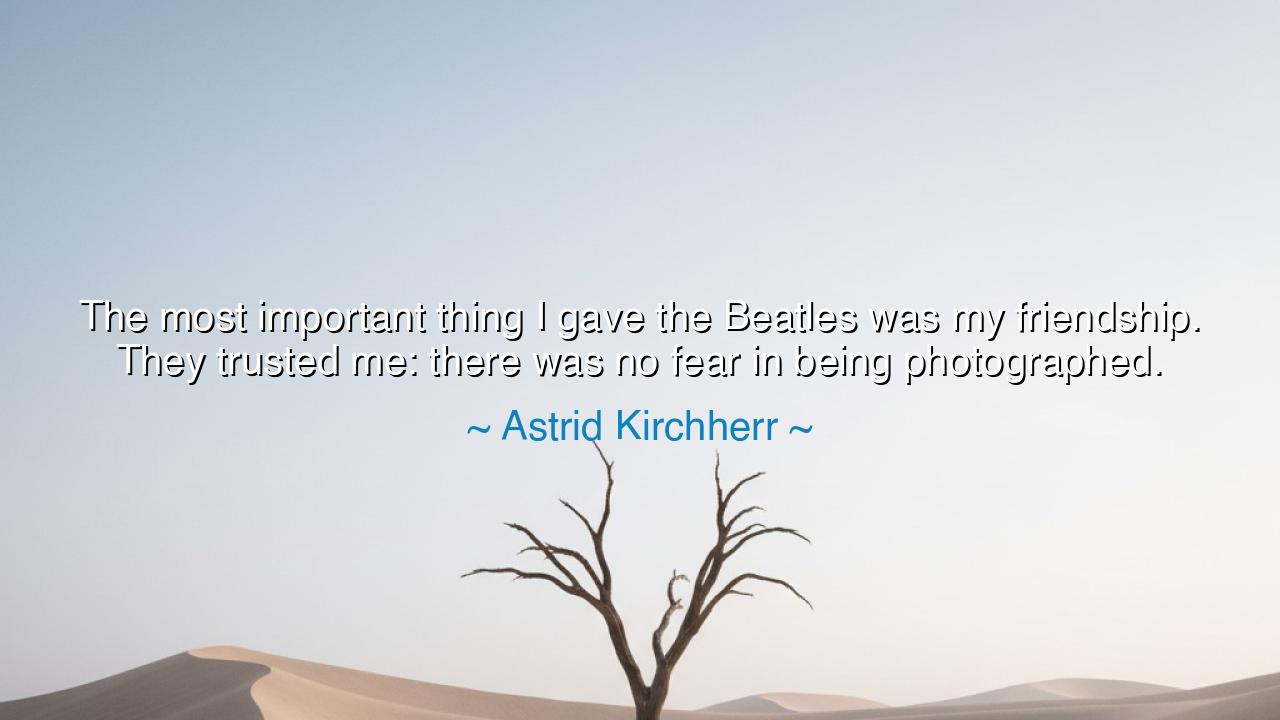
The most important thing I gave the Beatles was my friendship.
The most important thing I gave the Beatles was my friendship. They trusted me: there was no fear in being photographed.






"The most important thing I gave the Beatles was my friendship. They trusted me: there was no fear in being photographed." These words by Astrid Kirchherr are a powerful testament to the sacred and transformative nature of friendship—a bond that not only creates trust but allows one to share moments of vulnerability without fear or hesitation. Kirchherr speaks of the deep, underlying force of friendship that transcends the superficial, a force that grants access to the heart of another and allows them to be seen in their most authentic form. Her words remind us that it is not just the acts we perform or the images we capture, but the trust and the connection behind those acts that hold the most significance.
In the ancient world, the power of trust and friendship was recognized as the foundation of all human interactions. The Greek philosopher Aristotle, in his Nicomachean Ethics, described friendship as one of the highest virtues. He spoke of three kinds of friendships: those based on pleasure, those based on utility, and those based on virtue. The latter, virtuous friendships, were the truest and most enduring. In such friendships, both individuals seek the good for one another, and the bond transcends mere transactional benefits. Kirchherr’s relationship with the Beatles mirrors this ideal. It was not based on the pleasures of fame or the utility of social connections, but on a deep bond of trust and mutual respect. The Beatles saw in her not only a talented photographer but a true friend, someone who respected their authenticity and did not seek to exploit them but to capture them as they truly were.
This kind of deep friendship is exemplified in the story of David and Jonathan in the Bible. Their friendship was marked by a mutual commitment to loyalty and trust, a bond that allowed them to stand together even when the world around them sought to tear them apart. Jonathan, despite being the son of King Saul, could have easily sided with his father in the struggle for power. Yet, he chose David—not out of personal gain, but because he recognized in him a man of virtue. Their friendship was not contingent on status or expectation but was based on trust and a shared commitment to the greater good. This trust was the essence of their bond, just as it was the essence of Kirchherr’s relationship with the Beatles—a trust that allowed them to be their true selves, unguarded and without fear of judgment.
Similarly, in the life of Socrates, we see how trust and friendship shaped the path of a great philosopher. His relationship with Plato was not based merely on teaching and learning; it was built on a shared vision of virtue and the pursuit of truth. Socrates trusted Plato not just with his knowledge but with his very essence. In turn, Plato learned from Socrates not just intellectually, but in a deeply personal way, allowing their friendship to shape his life and philosophy. The trust between them, as Kirchherr experienced with the Beatles, allowed each to express their true selves, free from the constraints of public perception or personal fear.
The beauty of Kirchherr’s bond with the Beatles was that it allowed them to be vulnerable—to be themselves in a world that was rapidly turning them into public figures. The photographs she captured of them, iconic and enduring, were not just about their fame or image but were about their souls, unguarded and captured in moments of true connection. Kirchherr provided the Beatles a space where they could be free of the pressures and expectations placed upon them. Her friendship was the foundation of this freedom, and it is what made her work with them so profoundly meaningful. The trust they placed in her allowed them to present themselves without fear, knowing they would be seen as they truly were—not as the world wanted them to be.
The lesson we draw from Kirchherr’s words is clear: friendship is not just about shared experiences or common interests; it is about the deep, unshakable trust that forms the foundation of every meaningful relationship. In our own lives, we must seek to cultivate friendships that are built on this same kind of trust—relationships where we feel safe to express our true selves, free from judgment or fear. When we trust one another in this way, we allow for the kind of connection that leads to growth, vulnerability, and the deep satisfaction of knowing that we are truly seen and valued.
In practical terms, we must strive to be the kind of friends who offer not just our presence, but our authenticity, and our trust. Let us build friendships that are rooted in mutual respect and genuine care, where each person is free to be themselves, unafraid of judgment or exploitation. Let us create spaces where trust thrives and where we can walk through life together, knowing that we are seen, valued, and loved for who we truly are. In this way, we can form bonds that, like the one between Kirchherr and the Beatles, transcend the fleeting nature of fame or superficial connection, becoming lasting and transformative forces in our lives.






AAdministratorAdministrator
Welcome, honored guests. Please leave a comment, we will respond soon